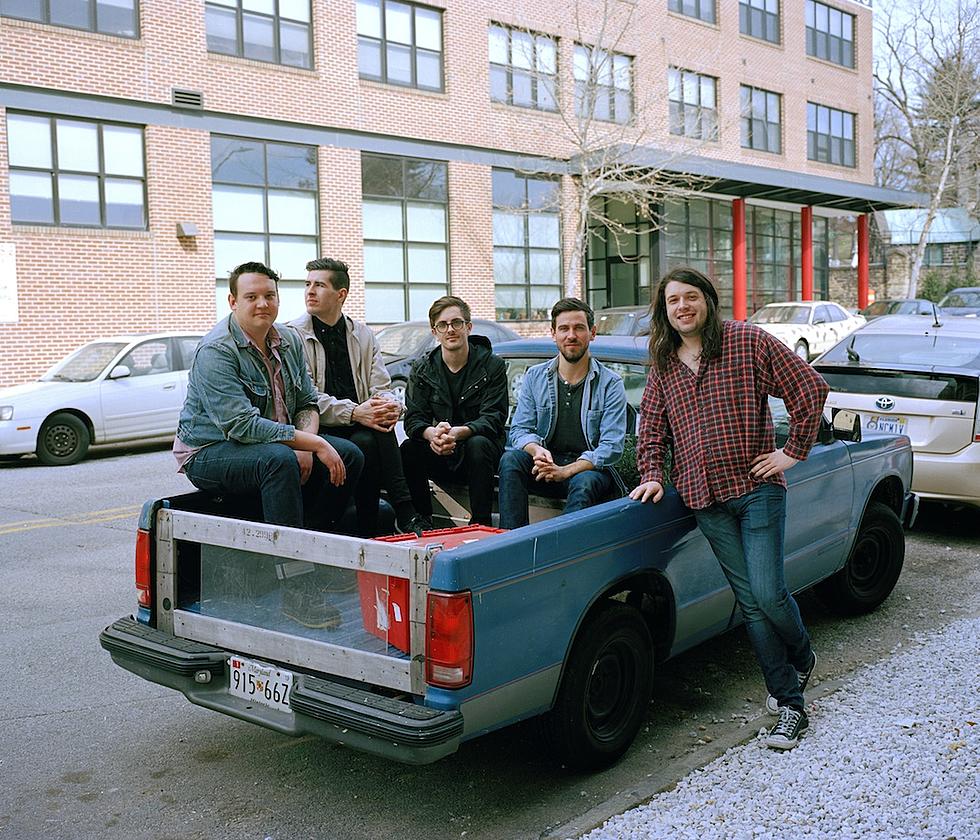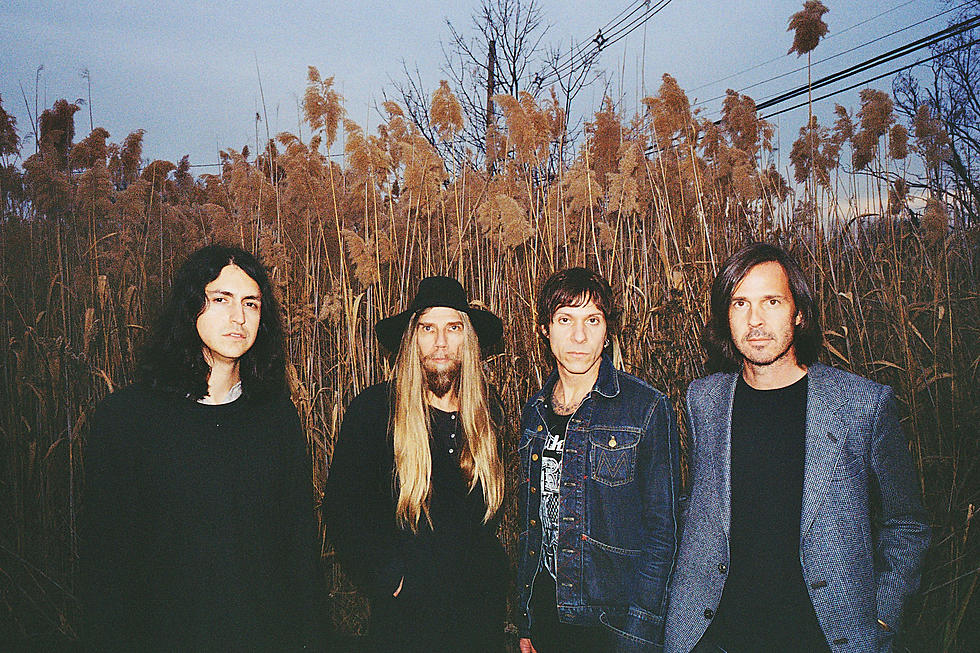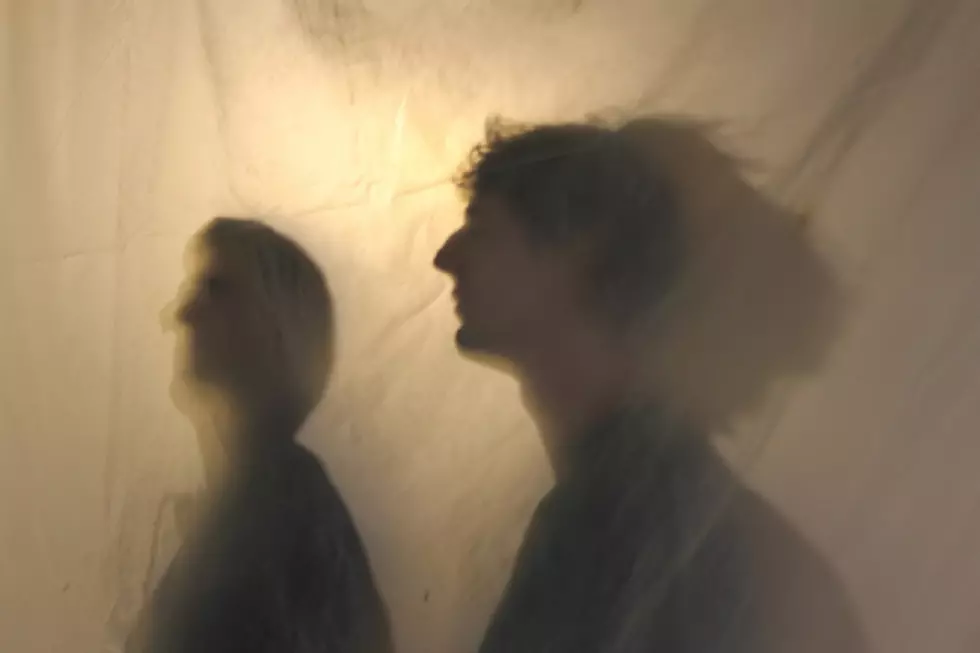
Century Palm’s Hyper-Alienated Debut Is Pleased to ‘Meet You’
Walking into Toronto’s Rehearsal Factory, it’s easy to get lost in the building’s winding hallways, featuring room after room of practice spaces and studios. It's here that we find the members of Century Palm, busy rehearsing ahead of their tour in support of debut album, Meet You. For songwriters Andrew Payne (guitar, vocals) and Paul Lawton (bass, vocals), those feelings of isolation and anonymity were the major impetus behind the album, as both relocated to Toronto from smaller cities in Canada.
Payne joined the Toronto incarnation of Lawton’s Ketamines with drummer Jesse Locke, but quit after a particularly grueling tour that had him almost swearing off music altogether for a life of cooking and gardening. But it wasn’t long until the three started collaborating again, this time with Payne at the helm, setting the music’s tone.
After a few different members took on synth and guitar duties, their membership really coalesced with the addition of Penny Clark from Tough Age, who handles both, as well as backup vocals. By that point, the band had released a four-song demo and a 7’’, but made quick work of putting together their first album.
Meet You is the result. It’s a record rooted in post-punk, krautrock and a bit of glam, and uses those sounds to highlight and intensify the themes of personal alienation. You can read our interview with the band and listen to the record below, premiering today ahead of its release this Friday, March 10.
Could you talk about your relationship with Deranged Records? I know you’ve done a couple releases with them now.
Paul Lawton: Gord [Dufresne] and I were friends because Gord helped me press Mammoth Cave records for a few years. He and I developed a pretty good relationship. He was also at SAMO. I submitted our project, the “White Light” / “New Creation” single, and he told me it was the best thing he’d heard in a really long time. And he made an offer to do a 7’’ and an LP. I have a lot of Deranged records in my collection; I like his ethic. His track record is pretty strong. We thought being on Deranged in Toronto, there’s not a lot of Toronto bands on that label — Career Suicide and Fucked Up, and a few others. What else has he done in Toronto?
Those are the first two that come to mind. There’s also Wastoids, Brutal Knights ...
PL: We thought that being on Deranged would get us in a different scene. When I folded and put Ketamines on hiatus, I felt very outside of the scene here, and felt stuck musically. We’d been playing a variation on the same show over and over again. I didn't feel like we were ever getting better. I thought being on Deranged would introduce us to another scene. Maybe because of our age or who our network is, it hasn’t worked out that way …
Andrew Payne: Oh, I didn’t know it didn’t work out yet. [Laughs]
PL: Well, it didn’t work out in the sense [that] it would help us play more punk-oriented shows.
Jesse Locke: We kind of stick out on the Deranged catalog anyway.
PL: I think in his mind we fit in more with the pop-minded bands that he has on the label. I’ve always associated Deranged with hardcore bands, and we’re definitely not that.
AP: I was actually surprised he liked our band and still likes it. [Laughs] That’s cool.
PL: He’s been pretty great to us. He’s been pretty hands-off, and we bring whatever it is to the table that we want.
JL: I’m really stoked to be on Deranged.
Penny Clark: Yes!
JL: I think it’s a really important Canadian label.
Going off of that feeling of being stuck in one place, or lost in a scene, a lot of the record seems to be about that kind of anonymity that you have living in a big city. I don’t want to read too much into biography, but given that you're all from out west …
PC: Actually, I’m from here originally. I’m the youngest, also.
PL: We met Penny out west, but she’s from here.
Got it. With Tough Age being a West Coast band, I thought that you had come from there. Sorry! How much are the tensions in the lyrics on the record a result of living in Toronto?
AP: For me, I’d just been doing fun bands before. Not taking myself too seriously. In the studio, if something made me laugh, we’d do it. Which doesn’t always turn out as the best listener experience.
PC: Now it’s the opposite. [Laughs]
AP: Right, now I’m done having fun. [Laughs] But after stopping making music for awhile, I thought when I picked it back up that I’d try to take it more seriously, and the lyrics are more serious than they ever have been. It’s basically me dumping all of these things that make me feel awful or slightly weird. It’s a collection of all those things I’ve never addressed before.
PL: For sure, my songs on the record are 100 percent about just pent-up feelings of hyper-alienation. I lived for the last 10 years before moving to Toronto in a small town where you kinda know everyone in the scene and you’re in something, and you come here and I feel fairly anonymous here.
JL: I hope you don’t feel like that all the time. “I’m always alienated.” We have a lot of friends here, too. But I think it’s okay to express that in a song.
PC: What about Drake and the Raptors and all that?
PL: I do really enjoy basketball, so …
JL: Yeah, you enjoy Toronto more than anybody.
PL: I do, but I’m also not one-dimensional either. I’m not being like, “Oh yeah, the Six! Everything rules here!” I can’t ignore all of the bad stuff I see every day.
Complaining about Toronto is a very Torontonian thing to do.
PL: I guess, right? So, maybe I’m picking up on that.
PC: It’s like an everywhere thing to do.
PL: I think when Andrew and I put our songs together, there’s an agreement on tone. If that makes sense.
AP: I also knew going into this that Paul likes more serious lyrics, so I thought, 'Okay, I’ll give it a try.' They were definitely influenced by him.
Yeah, your songs work really well alongside each other on the record. There’s this theme of distances, between cities, between people, between selves.
PL: You come here and change in a way that’s unexpected sometimes. Both positive and negative. That song “King of John Street” is like, you go through that experience, and then you pump yourself back up again. The big finish of that song is like, “Okay, you can’t just let yourself get bogged down by that feeling of isolation” — you just gotta, like, keep going.
I noticed that cyclical theme, too, in “New Creation.” Whatever’s new will become old, and you’ll have to make something new again. There’s almost an irony there because you’ve recorded it twice.
All: [Laugh]
AP: Yeah, the second time we recorded it, I was like, “Oh, maybe we should change the name. Maybe it shouldn’t be called this anymore.” But it is a new version of “New Creation.”
What made you want to re-record that song?
PL: Gord explicitly asked for it to be on the LP. A lot of the bands I love have a single version of a song and an LP version. I go back and forth between these two about which I like more. I think the consensus is that we like the single version more?
JL: I collect 45s, as a lot of people in the band do, so it’s kinda cool to have two different versions. The real fans can see the older, rarer version.
PL: And it makes me think of Guided by Voices, who would record a super lo-fi version on their LP and then do a slick version on the single. We kinda did that in reverse.
Which version do you play live?
AP: It’s still the same song. We just changed the tones a bit and the pace of it. There’s more layers.
JL: I think my drum part is more interesting on the album version, if people are paying attention to that.
PC: It’s Sarah [Ford] playing synth on the single version, not me.
So, you prefer your version?
PC: No, no, I actually prefer the other. [Laughs] I think that one’s more fun. This one’s more serious — we tried to make it match the tone of the album. I just think about walking through the snow now when I hear that song, so that’s how I played it.
PL: The day we did that photo and video shoot [for the song], down by the water, it’s just so beautiful — you can’t even believe you’re in Toronto because of the …
JL: Giant ice waves. The greatest thing ever.
AP: The song is about being addicted to making new things. That’s kind of what this band is about. It’s what keeps me in this band. It’s fun recording a new song. It’s like, “That didn’t exist before! I can’t believe I’m in that band.”
It’s interesting, too, because the song focuses on that push for new creations, but your sound is very much rooted in the late 1970s. Were you deliberately trying to recall a specific sound?
AP: For me, yeah. I like most music and movies from the early '80s. So, a lot of the synth sounds are from that era. But I don’t want to be a revival band or anything like that. It’s like, everyone stopped making this music, and they should’ve kept going, so I guess we’ll do it and keep trying to push it in new directions.
PL: Yeah I totally agree with that. It’s not that we fetishize that era. When we’re creating new music, we’re always trying to be modern about it. I personally want it to sound like it’s from 2017. I don’t want to make music that sounds like the '70s, but it’s influenced by that. There’s a translation process that occurs when the four of us put stuff on top of it that make it sound that way.
JL: The thing with those synth-pop and post-punk bands from the late '70s and early '80s was they were trying to make music of the future back then. I think we’re trying to carry on that spirit. We don’t want to make a throwback album.
Yeah, I wasn’t trying to imply that you were a throwback band, but it seems very intentional and deliberate that you’re pulling from those sounds.
PL: We’ve been getting a lot of New Order references. I guess I understand that.
JL: Like dour synth-pop, I guess?
PL: Don’t get me wrong — the fact that people are picking up on a New Order vibe, that’s amazing. But I also think it’s tricky when people get stuck on a reference point and don’t hear anything beyond that.
PC: Well, Andrew, you were saying that you listen to a lot of Siouxsie and the Banshees. Aren’t they one of your big influences?
AP: Yeah, that’s funny. That’s one of my bigger ones, outside of the bands we get compared to a lot. That’s one that doesn’t come out. I don’t think we sound like them very much. But it’s funny how that’s an influence, but it doesn’t come through in the sound.
PL: If you listen to a lot of Andrew’s old bands, they got compared to Devo a lot. I think it’s the voice.
AP: Even in those bands, it wasn’t on purpose. I wasn’t a huge Devo fan. I am now, and they’re great, but at the time I wasn’t like, “I want to sound like Devo!” I really like when vocalists have stilted vocals or they're awkward, rather than a smooth sound. Those don’t really grab me as much. I like it when things are a little off, and the Devo comes out of that. And Talking Heads.
The total package of what you’re doing sonically also helps shore up the lyrics. There’s that theme of isolation, and the stilted vocals, for instance, help reinforce that. Is there something about those particular sounds that you’re mining that helps illustrate those feelings to you?
PL: For sure. The delivery and the feel of what we’re trying to capture is, to me, centered around atmosphere and those stylistic choices of vocal patterns. My natural singing voice is pretty high, and I think that when I try to do a deeper voice, it's a stylistic choice to capture some of that sourness or feeling. It helps the listener. If I have this bright, cheery singing voice, it’s not going to translate as well. It’s all in the act of translation for both of us.
AP: I just like awkward guitar playing [mimes awkward guitar playing]. And singing as well.
PL: It’s a common thing when we’re jamming and rehearsing, or if we don’t capture the mood just right, or if it’s just a hair too fast, it loses the sense of anxiety, and it becomes more manic, so we’re constantly trying to refine the atmosphere. I think because we all have roots in punk bands, as a history, the tendency is to go fast and hard. That’s what we grew up playing.
JL: I guess it’s a Colin Newman thing, too. When he’s writing Wire songs, you come with all these parts in mind, and then, “Okay, now what we can take out of this? Would it be more effective if we removed a layer?”
AP: There were also times where we kept adding things, too. Like that Roxy Music influence and getting that maximalist sound. Having the maximalist “Sick of It,” which is all saxophones and 10 guitar solos and craziness, and put that on the same side as “Reset Reaction,” which is super stripped-down. There’s no synth outside of the intro. It’s more minimalist.
So, there’s a kind of build-up to that maximalism on the record.
PL: I think when we constructed the flow of the album, that was the decision. To build, and then fall, and then build up again. The first side is a gradual increase of sounds and ideas. “Then You’re Gone,” which has that great synth line, and then “These Walls,” which gets heavy, in a way. “Sick of It” builds and builds, while “New Creation” kinda brings it back down.
JL: We giveth and we take away. [Laughs]
AP: Yeah, I like taking both sides where we can both like minimalist and maximalist sounds. We’re fans of both.
PL: We’ve all spent a lot of time making music that no one ever listens to, so when we’re making a record like this, and put the time into constructing it in such a way, we have to do it for us and what we’re into, and what we like. And by doing that, you’re not going to trap yourself into doing one thing over and over again. We want to keep it interesting for ourselves.
So, is this band about pushing or challenging yourselves?
PC: I like to try a new thing in every band I join; otherwise it’s not interesting. So, right now, I play the keys and the guitar, and that’s lots. I like that. As long as I’m learning something I haven’t played before, I’m happy.
JL: Penny and I are in three bands together right now [Tough Age, Chandra and Century Palm], which is cool. Three different kinds of bands, so that’s fun.
AP: For me, it’s songwriting. I’d never tried to write a slow song, and that became “Another You” on the album. That was my first kick at that. Trying different tempos and different vocal styles. I’m always trying to change.
PC: I think you’re interesting, Andrew, because you take every piece of feedback very seriously. Paul is obsessed with the song “Baker’s Street.” We were playing it in the car, and he was like, “This is the best song ever! We need to make more songs like this. We need to make this song,” and Andrew was like, “What do you like about it?” [Laughs]
JL: We entertain Paul’s every whim, to a fault.
PC: “Which parts do you like the best?” [Laughs]
PL: Andrew’s way more thoughtful about his songs, so when they come in, the ideas are already pretty solid and we just build on it. And then my songs, we, I think, struggle to agree on which songs will come in and which ones won’t. Not struggle, but I think that there’s more of a critical lens maybe, because Century Palm is Andrew’s vision to start. So, the songs I’ve contributed have had to follow, but the way we work together enables that.
More From CLRVYNT









